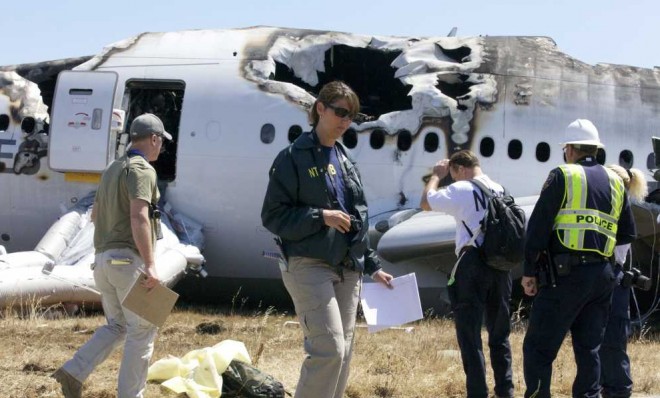The odds are 11 million to 1 that you'll die in a plane crash
Flying is still safer than ever


A free daily email with the biggest news stories of the day – and the best features from TheWeek.com
You are now subscribed
Your newsletter sign-up was successful
There were two fatal airplane accidents over the weekend: Asiana Airlines Flight 214's crash landing in San Francisco killed two passengers, while the fiery crash of an air taxi in Alaska claimed the lives of all 10 people on board. The twin tragedies have raised questions about the safety of air travel, but experts say that passengers can rest assured that flying is safer now than it has ever been.
One reason is that aircraft — especially large commercial airliners like Asiana's Boeing 777 — are structurally more sound than ever. Another is that improved cockpit technology has made collisions less likely. Large crashes are still big news, but that is partly because they're so infrequent. Here is a look at the record, by the numbers:
2
The Week
Escape your echo chamber. Get the facts behind the news, plus analysis from multiple perspectives.

Sign up for The Week's Free Newsletters
From our morning news briefing to a weekly Good News Newsletter, get the best of The Week delivered directly to your inbox.
From our morning news briefing to a weekly Good News Newsletter, get the best of The Week delivered directly to your inbox.
Asiana Flight 214 passengers who were killed when the jet, coming down too slowly, hit a sea wall and crashed onto the runway. The victims, Ye Mengyuan and Wang Linjia, were both 16-year-old students from China's eastern Zhejiang province, part of a group heading for summer camp.
305
Passengers and crew members who survived the crash. "It may have been worse if that fuselage had been designed with practices that were common 20 or 30 years prior," said former Boeing safety engineer Todd Curtis. There also might have been more fatalities, he said, if the accident had happened in a developing country without an advanced trauma center nearby.
54
A free daily email with the biggest news stories of the day – and the best features from TheWeek.com
Percentage of passengers who died in plane crashes with at least one fatality from 1962 to 1981.
39
Percentage of people in such plane crashes who died from 1982 to 2009.
0.01
Deaths per 100 million passenger miles in airplanes. Some airline industry executives assert that passengers are now more likely to die in an airport than on an airliner.
0.05
Deaths per 100 million passenger miles on buses and trains.
0.72
Deaths per 100 million passenger miles in cars.
1 in 1.2 million
Airplane flights that involve some kind of accident. The mishaps are not always fatal.
1 in 3.7 million
Chance that you will be killed by a shark.
1 in 11 million
Chance that you will be killed in an airplane crash.
1 in 5,000
Odds that you will be killed in a car crash. "You're much more likely to die getting to the airport than you are flying in the plane," said the editors at Discovery.
95.7
Percentage of people who survive plane crashes. In many recent major accidents — including the 2009 "Miracle on the Hudson," when Capt. Chesley B. "Sully" Sullenberger ditched an Airbus A320 in the Hudson River — everyone on board has made it out alive.
80
Percentage of plane accidents that occur during the first three minutes or last eight minutes of a flight
Sources: ABC News, Airlines.org, Associated Press, Discovery, Entertainment Weekly, National Geographic, Slate, USA Today
Harold Maass is a contributing editor at The Week. He has been writing for The Week since the 2001 debut of the U.S. print edition and served as editor of TheWeek.com when it launched in 2008. Harold started his career as a newspaper reporter in South Florida and Haiti. He has previously worked for a variety of news outlets, including The Miami Herald, ABC News and Fox News, and for several years wrote a daily roundup of financial news for The Week and Yahoo Finance.
-
 Political cartoons for February 12
Political cartoons for February 12Cartoons Thursday's political cartoons include a Pam Bondi performance, Ghislaine Maxwell on tour, and ICE detention facilities
-
 Arcadia: Tom Stoppard’s ‘masterpiece’ makes a ‘triumphant’ return
Arcadia: Tom Stoppard’s ‘masterpiece’ makes a ‘triumphant’ returnThe Week Recommends Carrie Cracknell’s revival at the Old Vic ‘grips like a thriller’
-
 My Father’s Shadow: a ‘magically nimble’ film
My Father’s Shadow: a ‘magically nimble’ filmThe Week Recommends Akinola Davies Jr’s touching and ‘tender’ tale of two brothers in 1990s Nigeria
